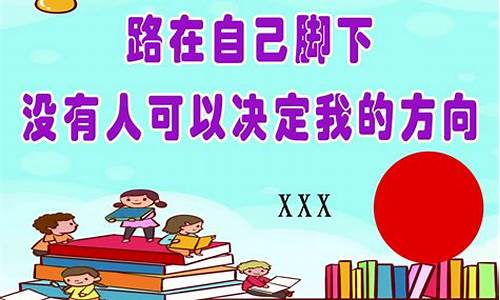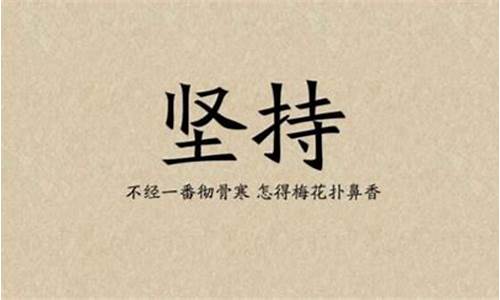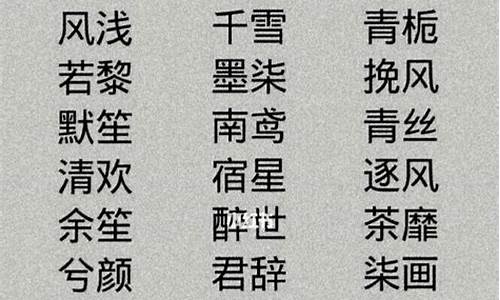您现在的位置是: 首页 > 情感语录 情感语录
八年级英语句式_八上英语句子结构
tamoadmin 2024-09-05 人已围观
简介1.八年级英语句子分析。急!!!!2.八上英语第8单元知识点和词组,句子。急~~~~~~~~~~3.八年级上册英语重点词组和句子4.英语句子的八大基本结构例句5.英语 的句子结构。。详细一些6.英语句子成分共有几个7.英语中主语,谓语,宾语,状语,定语,表语,宾补,等都是什么词,加在句子何处,有例句的追加一、形容词/副词的比较级和最高级1、形容词/副词的比较级和最高级的构成规则(1)单音节词和少数
1.八年级英语句子分析。急!!!!
2.八上英语第8单元知识点和词组,句子。急~~~~~~~~~~
3.八年级上册英语重点词组和句子
4.英语句子的八大基本结构例句
5.英语 的句子结构。。详细一些
6.英语句子成分共有几个
7.英语中主语,谓语,宾语,状语,定语,表语,宾补,等都是什么词,加在句子何处,有例句的追加

一、形容词/副词的比较级和最高级
1、形容词/副词的比较级和最高级的构成规则
(1)单音节词和少数以-er,-ow结尾的双音节单词,比较级在后面加-er,最高级在后面加-est。
(2)以不发音e结尾的单音节单词,比较级在原形后加-r,最高级在原级后加-st。
(3)以一个辅音字母结尾的闭音节(即:辅音+元音+辅音)单词中,先双写末尾的辅音字母,比较级加-er,最高级加-est。
(4)以“辅音字母+y”结尾的双音节词, 把y改为i,比较级加-er,最高级加-est。
(5)其他双音节词和多音节词,比较级在前面加more,最高级在前面加most。
(6)有少数形容词、副词的比较级和最高级是不规则的,必须熟记。
2、形容词和副词比较级的用法
(1)“甲+be+(倍数)+形容词比较级+than+乙”表示“甲比乙…”或“甲比乙…几倍”。
(2)“甲+实意动词+(倍数)+副词比较级+than+乙”表示“甲比乙…”或“甲比乙…几倍”。
3、形容词和副词最高级的用法
(1)“主语+be+the+形容词最高级(+单数名词)+in/of...”表示“……是……中最……的”。
(2)“主语+实意动词+(the)+副词最高级+in/of...”表示“……是……中最……的”。
二、句子成分
1、主语:句子所陈述的对象。
2、谓语:主语发出的动作。一般是有动作意义的动词。
3、宾语:分为动词宾语和介词宾语,属于动作的承受者。
4、系动词:表示状态或状态变化的动词,没有实际的动作意义。如 be, 感官系动词(look, sound, smell, taste 和 feel)、保持类系动词(keep, stay 和 remain)、状态变化类系动词(become、get、turn 和 go)等。
5、表语:紧跟系动词后面的成分。
6、定语:修饰名词或代词的成分。
7、状语: 修饰形容词、副词、动词或句子的成分。
8、补语:分为宾语补足语和主语补足语。是对宾语和主语的补充说明,与其有主动或被动的逻辑关系。
注意:主语、谓语、宾语、系动词、表语、补语是一个句子的主干成分;定语和状语是一个句子的修饰性成分,不是主干成分。
三、句子类型
1、简单句的基本形式是由一个主语加一个谓语构成。
2、复合句由一个主句和一个或一个以上的从句构成。
3、两个或两个以上的简单句用并列连词连在一起构成的句子,叫做并列句,其基本结构是“简单句+并列连词+简单句”。
四、简单句的五种基本句型
1、“主语 + 谓语”(即“主谓”句型)
例:They arrived in Harbin yesterday morning.
分析:“they”(主语)“arrived”(谓语)。
2、“主语 + 谓语 + 宾语”(即“主谓宾”句型)
例:I study English.
分析:“I”(主语)“study”(谓语动作)“English”(宾语即动作涉及的对象)。
3、“主语 + 谓语 + 间接宾语 + 直接宾语”(即“主谓双宾”句型)
例:Our teacher taught us English.
分析:“our teacher”(主语)“教”(谓语动作)“us”(间接宾语)“English”(直接宾语)。
4、“主语 + 谓语 + 宾语 + 宾语补足语”(即“主谓宾宾补”句型)
例: He asked her to go there.
分析:“he”(主语)“asked”(谓语动作)“her”(宾语即动作涉及的对象)“to go there”(补语—补充说明宾语做什么)。
5、“主语 + 系动词+ 表语”(即“主系表”句型)
例: I am a teacher. 我是一名老师
分析:“I”(主语)“am”(系动词)“a teacher”(表语—即表明主语的身份)。
五、宾语从句
1、宾语从句的含义
在主句中做宾语的从句叫做宾语从句。
2、宾语从句的分类
(1)动词宾语从句:顾名思义,它是位于动词后面的宾语从句。
(2)介词宾语从句:顾名思义,它是位于介词后面的宾语从句。
(3)形容词宾语从句:顾名思义,它是位于形容词后面的宾语从句。
3、引导名词性从句的连接词
(1)that:没有含义,在宾语从句中不做成分
(2)whether/if:表示是否,在宾语从句中不做成分。
(3)连接代词:what, which, who, whom, whose(在宾语从句中做主、宾、表和定语)
4、在做宾语从句的题目时应注意两点
(1)时态:
①当主句是现在时态时,宾语从句可以根据需要使用任何时态。
②当主句是过去时态时,宾语从句必须是一种过去的时态。
③当表示客观事实或普遍真理的句子做宾语从句时,任何时候都用一般现在时。
(2)语序:任何从句都使用陈述句语序,宾语从句当然也不例外。
八年级英语句子分析。急!!!!
英语句子成分:
主要成分:主语、谓语、宾语、表语 汉语中没有此成分
次要成分:定语、状语、宾补/主补、同位语.
插入语,属于修辞类的功能形式,一般都不作为句子成分看待.
例如:
To see 主语is谓语 to believe.表语
He 主语came to 谓语school 宾语late again.状语
We主语 Chinese同位语 should try harder谓语 to make our country stronger and more powerful 宾语
to make our country 宾语stronger and more powerful 宾补
Jack is a wise定语 man
八上英语第8单元知识点和词组,句子。急~~~~~~~~~~
比较级的 规则变化
单音节词和少数双音节词,加词尾-er,-est来构成比较级和最高级。
一般单音节词 tall(高的) taller tallest
末尾加-er,-est great(巨大的) greater greatest
以不发音的e结尾和以- le结尾的双音节词只加-r,-st
nice(好的) nicer nicest ,able(有能力的) abler ablest
以一个辅音字母结尾的闭音节单音节词,双写结尾的辅音字母,再加-er,-est
big(大的) bigger biggest
hot热的) hotter hottest
"以辅音字母+y"结尾的双音节词改y为i,再加
-er,-est easy(容易的)
easier easiest ,busy(忙的) busier busiest
少数以-er,-ow结尾的双音节词末尾加-er,-est
clever(聪明的) cleverer cleverest
narrow(窄的) narrower narrowest
其他双音节词如 important(重要的)
在important前面加more,最高级是most important
多音节词构成的比较级,如easily(容易地)
比较级more easily 最高级 most easily
这里interested是多音节词,所以用 more interested
八年级上册英语重点词组和句子
Unit 8 How was your school trip?
复习目标
1、学会询问和谈论过去发生的事情
2、了解全班同学的周末活动
语言目标
1、What did you do on your school trip?
2、Did you go to the zoo? No, I didn’t. I went to the aquarium.
3、Were there any sharks?
No, there weren’t any sharks, but there were some really smart seals.
语言结构
3、规则动词和不规则动词的一般过去式
4、一般过去时的肯定句和否定句
5、Did you....., Were there.....引导的一般疑问句
重点词汇
1、aquarium, science center, gift shop,/ seal, shark, octopus
2、ate, took, hung out, got,/ go for a drive, sleep late, yard sale, day off
应掌握的词组
1. talk about 谈论,talk over谈论
2. give a talk 作报告
3. he a talk to (with) sb.与某人谈话
4. go to the beach去海滩
5. he ice cream吃冰淇淋
6. go to the zoo去动物园
7. go to the aquarium去水族馆
8. hang out with one’s friends和朋友闲逛
9. take photos=take a photo=take pictures=take a picture照相
10. buy a souvenir买纪念品
11. he pizza吃比萨饼
12. a famous actor著名的演员
13. get one’s autograph得到了某人的亲笔签名
14. win a prize赢得奖品(奖项)
15. at the aquarium 在水族馆
16. he a great time玩得高兴,过得愉快
17. on the school trip在学校的旅游
18. Blue Water Aquarium蓝色水族馆
19. the Visitors’ Center游客中心
20.a dolphin show海豚表演
21. after that 后来
22. at the end of…在……结束的时候,在……的尽头
23. the Gift Shop礼品店
24. at the beginning of…在..开始的时候
25. a terrible school trip糟糕的学校旅行
26. that sounds interesting那听起来很有趣
27. make up a story编一个故事
28. go for a drive 开车兜风
30. in the rain在雨中
in the dark在黑暗中\
in the sun在阳光下
in the snow在雪中
31. take notes of=write down=copy down 写下,记下
32. he fun doing sth.很快乐的做某事
33. play computer games打电脑游戏
34. for sale 供销售
35. see you soon盼望很快见到你
36. in one’s opinion据某人看来,某人的观点上看
37. win the first prize获得了一等奖
38.a famous basketball player著名的篮球运动员
39. in the future在将来,今后
40. can’t help doing sth.忍不住做某事
41. the story goes that…据说……
42. a busy day off 繁忙的日,
in one’s off hours在某人的休息时间
the off season淡季
43. none of… ……当中没有一个
44. a hey rain 一阵大雨
a light rain一阵小雨
a fine rain 一阵细雨
44. all day = all day long 整天
all night = all night long整夜
应掌握的句子
1. How was your school trip?
你的学校旅行怎么样?
2. Talk about events in the past.
谈谈过去的。
3. Were there any sharks? No, there weren’t any sharks, but there were some really smart seals.
有鲨鱼吗?不,没有鲨鱼,但是看见了一些非常伶俐的海豹。
4. What else did you do?
你还做了别的什么事情吗?
5. Finally, they took the school bus back to school.
最后他们乘坐公共汽车返回学校。
6. At the end of the day, the science teacher was very hy because the students cleaned the bus after the trip.
在哪天结束的时候,自然老师很高兴,因为学生们在旅游之后把汽车打扫了一遍。
7. The students had a terrible school trip.
学生们度过了一次很糟糕的学校旅行。
8. They took the subway back to school.
他们乘坐地铁回到学校。
9. She lives in California. The weather was beautiful.
她住在加利福尼亚,天气很好。
10. On my next day off, I don’t want to go for a drive. That sounds really boring.
在我的下次日,我不想开车兜风。那听起来真的很烦人。
11. Did you he fun camping?
你的野营过得愉快吗?
12. No one came to the sale because the weather was so bad.
没有人来购买,因为天气是如此的糟糕。
祝你学习进步,更上一层楼!请记得纳,谢谢!(*^__^*)
英语句子的八大基本结构例句
八年级上知识点总结
Unit 1: How often do you exercise?
语言目标
● What do you usually do on weekends? I sometimes go to the beach.
● How often do you eat vegetables? Every day.
● Most students do homework every day.
重点词汇
● always, usually , often, sometimes , hardly , ever, never.
● how often, once , twice , three times a week , every day.
应掌握的词组
1. go to the movies 去看**
2. look after = take care of 照顾
3. surf the internet 上网
4. healthy lifestyle 健康的生活方式
5. go skate boarding 去滑板
6. keep healthy=stay healthy 保持健康
7. exercise=take(much)exercise=do sports锻炼
8. eating habits 饮食习惯
9. take more exercise 做更多的运动
10. the same as 与什么相同
11. be different from 不同
12. once a month一月一次
13. twice a week一周两次
14. make a difference to 对什么有影响
15. how often 多久一次
16. although = though虽然
17. most of the students=most students
18. shop=go shopping=do some shopping 购物
19. as for至于
20. activity survey活动调查
21. do homework做家庭作业
22. do housework做家务事
23. eat less meat吃更少的肉
24. junk food垃圾食物
25. be good for 对什么有益
26. be bad for对什么有害
27. want to do sth 想做某事
28. want sb to do sth想某人做某事
29. try to do sth 尽量做某事
30. come home from school放学回家
31. of course = certainly = sure当然
32. get good grades取得好成绩
33. some advice
34. hardly=not nearly / almost not几乎不
35. keep/be in good health保持健康
36.be stressed out紧张的,有压力的
37. take a vacation 去度
48.get back 回来
应掌握的句子
1. How often do you exercise? 你(你们)多久锻炼一次身体?
How often + 助动词do(does或did) + 主语 + do sth.? 疑问词how often是问频率(多久一次),(在这里助动词do(does或did) 是起帮助构成疑问的作用)与一般现在时或一般过去时连用,回答一般是用表示频率的副词,如:once, twice, three times…, 2. “What do you usually do on weekends?” “ I usually play .”
“周末你通常做什么?”“我通常踢足球。”
第一个do为助动词, 在这起帮助构成疑问的作用;而第二个do则是实义动词。
3. “What’s your forite program?” “It’s Animal World.”
=What program do you like best?
“你最喜欢什么节目?”“动物世界。”
4. As for homework , most students do homework every day .
as for...意思是“至于;关于”,常用于句首作状语,其后跟名词、代词或动词的-ing形式(即动名词)。如: As for him,I never want to see him here. 至于他,我永远不希望在这里见到。
As for the story,you'd better not believe it. 关于那故事,你最好不要相信。
5. Mom wants me to get up at 6:00 and play ping-pong with her .
want to do sth. 意思是“想要做某事”;
want sb. to do sth.意思是“想要某人做某事”。如:
Do you want to go to the movies with me?你想和我一起去看**吗?
The teacher doesn't want us to eat hamburgers.老师不想让我们吃汉堡包。
6. She says it’s good for my health.
be good for...表示“对……有益(有好处)”;其反义为:be bad for...。(这里for 是介词,后跟名词、代词或动名词)
如:It's good for us to do more reading. 多读书对我们有好处。
Reading in bed is bad for your eyes.在床上读书对你的眼睛有害。
7. How many hours do you sleep every night?
8. I exercise every day , usually when I come home from school .
9. My eating habits are pretty good . 这里pretty相当于very 。
10. I try to eat a lot of vegetables , usually ten to eleven times a week .
try to do sth.表示“ 尽力做某事 ” ,不包含是否成功的意思而try doing sth.表示“(用某一办法)试着去做某事”。
如: You’d better try doing the experiment in another way.
你最好试试用另一种方法做这个试验。
11. My healthy lifestyle helps me get good grades.
help sb.(to) do sth.帮助某人做某事
12. Good food and exercise help me to study better.
这里better是well的比较级,而不是good的比较级
13. Is her lifestyle the same as yours or different?
=Is her lifestyle the same as your lifestyle or is her lifestyle different from yours? be the same as … / be different from …
14. What sports do you play ?
15. A lot of vegetables help you to keep in good health .
keep in good health = keep healthy = stay healthy
16. You must try to eat less meat .
try to do sth.表示“ 尽力做某事 ” ,不包含是否成功的意思,less是little的比较级
17. That sounds interesting.
这是“主语+系动词+表语”结构的简单句。sound(听起来),look(看起来),smell
(闻起来),taste(尝起来),feel(觉得),seem(好象),grow(变得),get
(变得)等词在英语中可用作系动词,后跟形容词作表语。如:
It tastes good. 这味道好。
The music sounds very sweet. 这音乐听起来很入耳。
The smoke grew heier and heier. 烟雾变得越来越浓了。
词语辨析
maybe 是副词,意为“大概, 可能,或许”,一般用于句首。May be是情态动词,意为“可能是..,也许是..,大概是..”.
a few (少数的,几个,一些)
a little (一点儿,少量)
表示肯定
few (很少的,几乎没有的)
little (很少的,几乎没有的)
表示否定
修饰可数名词
修饰不可数名词
none指人或物,强调数量,用how many提问,常与of连用。no one 多指人,强调“无人”这种状态,用who提问,不可与of连用,作主语时,其谓语动词用第三人称单数形式。
hard作形容词,意为“困难的,艰苦的,硬的”;作副词,意为“努力地,猛烈地”。Hardly意为“几乎不”。
Unit 2 What’s the matter?
语言目标
● What’s the matter? I he a headache.
● You should drink some tea. The sounds like a good idea.
● I he a sore back. That’s too bad .
● I hope you feel better soon.
重点词汇
● head, nose, eye, ear, tooth, neck, stomach, back, leg, arm, foot, throat
● thirsty, stressed out,/ dentist, lie, rest, honey, water, illness, advice.
● cold, fever, headache, toothache, stomachache, sore throat
应掌握的词组
1. He a cold 感冒
2. sore back 背痛
3. neck and neck 并驾齐驱,齐头并进
4. I he a stomachache 我胃痛
= I he got a stomachache = There is something wrong with my stomach
= My stomach hurts = I he (got) a pain in my stomach
5. What’s the matter? 怎么了?
= What’s the trouble (with you)? = What’s your trouble?= What’s wrong (with you)?
= What’ the matter (with you)? =What has hened to you?
= Is there anything wrong (with you)? = what’s up?
6. sore throat 咽喉痛
7. lie down and rest 躺下休息
8. see a dentist 看牙医
9. drink lots of water 多喝水
10. hot tea with honey 加蜂蜜的热茶
11.That’s a good idea 好主意
12.That’s too bad 太糟糕了
13.I think so 我认为如此
14. I’m not feeling well. 我觉得不太舒服
= I’m not feeling fine/all right. = I’m feeling ill/sick. =I feel terrible/bad.
= I don’t feel well.
15. get some rest 多休息
16. I he no idea = I don’t know 我不知道
17. stressed out 筋疲力尽
18. I am tired 我累了 He is tired. 他累了
19. a healthy lifestyle健康的生活方式
20. traditional Chinese doctors传统中医
21. a balance of yin and yang阴阳调和
22. you he too much yin.你阴气太盛
23. to eat a balance diet饮食平衡
24. healthy food 健康食品
25. stay healthy 保持健康=keep healthy=keep in good health = keep fit
26. enjoy oneself (myself, yourself, herself, himself, themselves, ourselves, itself
反身代词) 玩得高兴,过得愉快
=he a good time = he a wonderful time = he fun
27. enjoy sth. =like sth. (名词)喜欢某物,
enjoy doing sth.喜欢做某事=like doing sth practice doing sth.练习做某事,
mind doing sth. 介意做某事, finish doing sth.完成某事,
give up doing sth.放弃做某事, can’t help doing sth.忍不住做某事,
keep doing sth. 坚持做某事. (keep on doing sth. / keep sb. doing sth. )
be busy doing sth. 忙着做某事 be used to doing sth.习惯于做某事
make a contribution to doing sth.为..做贡献
go on doing sth. 继续做某事 forget doing sth.忘记做过某事
remember doing sth. 记得做过某事 spend....(in) doing sth. 花(时间)来做某事
prefer doing sth.to doing sth.比起(做...)来更愿意(做...)
28. at the moment = now 此刻
29. Host family 东道家庭
30. Conversation practice会话练习
31. I’m sorry to hear that.听到此事我很难过
应掌握的句子
1. What’s the matter? I he a bad cold. 你怎么了?我得了重感冒。
2.Maybe you should see a dentist. 或许你应该看牙医。
我们不应该上课吃东西。We shoudn’t eat food in class,
3.I hope you feel better soon. 我希望你很快好起来。
我希望他明天能来。I hope you will come here tomorrow.
4.Traditional Chinese doctors believe we need a balance of yin and yang to be healthy.
传统中医认为我们需要阴阳调和以保持身体健康。
Teachers think we should study hard to get good grade.
我相信每天晚上睡眠8个小时很重要。
5.Eating Dangshen and Huangqi herbs is also good for this.
吃党参和黄芪等草本植物也对这有好处。
Watching TV too much is bad for your eyes.
6.People who are too stressed out and angry may he too much yang.
太紧张易怒的人或许吃了太多的阳性食物。
7.It’s easy to he a healthy lifestyle, and it’s important to eat a balanced diet.
有一个健康的生活方式很容易,饮食平衡是很重要的。
翻译:学好英语不是很容易的。It’s not easy to study English.
8.When you are tired, you shouldn’t go out at night. 疲倦时,晚上你不该外出。
9.I believe him, but I can’t believe in him.
他的话是真的,但是我不信任他这个人。
10.I am not feeling very well at the moment. 这段时间我感觉不大好。
I’m tired and I he a lot of headaches. 我很疲劳,而且经常头痛。
11.I’m stressed out because my Mandarin isn’t improving.
我很容易紧张,因为普通话没有长进。
12.I practice playing the piano every day.我每天练习弹钢琴。
翻译:他每天练习踢足球。I practice playing every day.
13.She had finished writing the letter when I went in.
我进去时,她已经写完信了。
14.The doctor asked him to give up smoking.医生叫他戒烟。
翻译:不要放弃学英语。Don’t give up studying English.
15.Do you mind closing the window? 请把窗户关上好吗?
翻译:在这里吸烟你介意吗?Do you mind smoking here?
16.Mary couldn’t help laughing at his jokes.对于他的玩笑,玛莉忍不住笑了。
17.They kept working though it was raining.尽管天在下雨,他们仍坚持工作。
Unit 3 What are you doing for vacation?
语言目标
● What are you doing for vacation?
I’m spending time with my friends.
● When are you going?
I’m going next week.
● How long are you staying?
We’re staying for two weeks.
重点词汇
● babysitting, going sightseeing, going fishing
● how long / plan, decide / at home, get back
应掌握的词组
1. babysit one’s sister 照顾妹妹
2. visit one’s grandmother 看望奶奶
3. spend time with friends 和朋友们一起度过时光
4. visit cousins 看望表弟等
5. go to sports camp 去运动野营
6. o to the beach 去海滩
7. go camping 去野营
8. Go shopping 去买东西
9. go swimming 去游泳
10. go boating去划船
11. go skating 去溜冰
12. go walking去散步
13. go climbing 去登山
14. go dancing去跳舞
15. go hiking 去徒步远足
16. go sightseeing 去观光 go bike riding 骑自行车旅行,go fishing 去钓鱼
17. go house-hunting 去找房子
18. o on a hike 徒步旅行,
19. do some shopping 买东西
20. do some washing 洗衣服
21. do some cooking 作饭
22. do some reading 读书
23. do some speaking训练口语
24. do some sewing 做缝纫活
25. that sounds nice 那好极了
26. at home 在家
27. how about=what about ……怎么样?
28. how long 多长时间
29. how far 多远
30. how often 多长时间一次
31. how much, how many 多少
32. he a good time
=he fun= he a wonderful time= enjoy oneself 玩得高兴,过得愉快
33. show sb. Sth.=show sth. to sb.出示某物给某人看
give me the book=give the book to me 给我书,
pass me the cup=pass the cup to me 把杯子递给我,
sell me the house=sell the house to me 把房子卖给我
buy me a book =buy a book for me 给我买书,
make me a cake = make a cake for me给我做蛋糕
34. get back=come back回来
35. rent videos租借影碟
36. take walks=go for a walk散步
37. think about 考虑
38. decide on= decide upon决定一个
39. something different 不同的事情
40.a great vacation 一个愉快的期
41. I can’t wait 我等不及了
42. the famous movie star 著名的影星
43. an exciting vacation 激动人心的期
44. Ask her about her plans 向她询问她的
ask sb. about sth.向某人询问某事
45. forget to do sth. 忘记要做某事forget doing sth. 忘记做过某事
应该掌握的句子
1.What are you doing for vacation? I’m babysitting my sister.
期你要做什么?我要照顾我的妹妹。
2.Who are you going with? I’m going with my parents.你要和谁一起去?我要和父母一起去。
3.I’m going to Tibet for a week. 我要去西藏一周。
4.What are you doing there? I’m going hiking in the mountains.
英语 的句子结构。。详细一些
英语句子的八大基本结构:
1.第一种句型:主-谓(SV)
这种句型里的谓语一般是不及物动词,后面可以跟状语。
例Everybody went.
2.第二种句型:主-系-表(LSP)
前面第一句分析时有分享过这种句型里的系动词的用法,系动词在形式上是一种谓语动词,而表语实际是主语的补语,所以一般也将这种结构叫做“主-谓-补”(SVC)
例The lees are yellow.
3.第三种句型:主-谓-宾(SVO)
在这种句型里,谓语一般是及物动词,后面要跟宾语,这里的宾语一般都是直接宾语。宾语可以由名词、代语、数词、动名词、分词、不定式或从句来充当。
例The house caught fire.
4.第四种句型:主-谓-宾(直接)-宾(间接)(SVOO)
这个句子里涉及到两个宾语,所以谓语动词必须是可有双宾语的及物动词,也就是传说中的与格动词。
何谓与格动词?有解释说“它是直接宾语与间接宾语的不完全及物动词,有把某物从一个人转移给另一个人的意思”。直白一点就是谁把什么东西给了谁等类似的意思。直接宾语常指物,间接宾语常指人,相关的动词有give, provide, buy, write, ask等。
例I ge my son the book. 我把书给了我儿子。give就是与格动词,后跟两个宾语my son, the book.
5.第五个句型:主-谓-宾-宾补(SVOC)
在该句型里,宾语补足语与宾语一起组合构成复合宾语,要求谓语必须是可以带复合宾语的及物动词,如find, hold, let, heard等。
例I found the project difficult. difficult就是宾语project的补足语.
6.There be句型
There+be+主语+状语
这个句型其实属于倒装的一种,主语后置,there作为引导词,无实际意义。
例如:There are many children in the park.
7.主语+谓语+状语
这个句型是在主谓结构后通过状语对语义进行修饰补充,充当状语的一般是副词、介词短语等。
例如:She arrives early.
8.主语+谓语+宾语+状语
这个句型是在主谓宾结构后面通过状语进行修饰补充。
例如:I drive my car everyday.
英语句子成分共有几个
.句子的成分:句子成分是句中起一定功用的一个组成部分。句子成分可以分为八种。 1)主语subject:主语是句子的主体,是句子所要说明的人或事物,表示句子描述的是“谁”或“什么”。主语通常由名词、代词、数词、动词不定式、动名词、或主语从句担任。 如:To become a professor has been his ambition.当教授一直是他的抱负。(不定式作主语) What we shall do next is not yet decided.下一步我们做什么还未定下来。(主语从句作主语) 2)谓语predicate:谓语是说明主语的动作或状态的部分。谓语一般由动词或动词短语担任,位置在主语之后。 如:His mother is a doctor.他的妈妈是大夫。(系动词) We should pay attention to English idioms.我们应注意英语(Q吧)的习语。(动词短语) 3)表语predicative:表语是在连系动词之后表示主语性质、特征、状态或身份的部分。表语通常由名词、代词、形容词、副词、介词短语以及动词不定式、动名词、分词或表语从句担任,位置在连系动词之后。 如:The football match is on.足球赛正在进行。(副词) All the pupils are on the playground.学生们现在都在操场上。(介词短语) He seemed surprised at the new.他对这消息似乎感到吃惊。(分词) The key question is how we should solve the problem.关键的问题是我们应该如何解决这个问题。(从句) 4)宾语object:宾语表示及物动词的对象或内容。介词后面的名词或代词叫做介词宾语。宾语通常由名词、代词、数词或与之相当的结构但任,位置在及物动词或介词之后。 如:Would you mind coming earlier tomorrow? 你明天早点来行吗?(动名词) I don’t know where he has gone.我不知道他去哪了.(从句) 5)补语complement:补语用于补充说明主语或宾语。补语通常由形容词、名词或其他相当的结构担任。补语分为宾语补足语和主语补足语。 宾语补足语: 如:The doctor advised her to stay in bed for a week.医生建议她卧床休息一周。(动词不定式) They saw her walking into the bookstore.他们看见她进了书店了。(分词) You should put your books in order.你应该把书摆整齐。(介词短语) 主语补足语:含有宾语补足语的句子改为被动语态时,原宾语和宾语补足语变为主语和主语补足语。 如:we found him working in the office.我们发现他正在办公室工作。 He was found working in the office.他被发现在办公室工作。(分词作主补) 6)定语attributive:定语用于限定或修饰名词或代词,通常由形容词或与之相当的结构担任。单词作定语一般放在被修饰语的前面,短语或从句作定语放在被修饰语的后面。 如:He is an honest boy.他是一个诚实的男孩。(形容词) The girl playing the violin is a freshman.拉小提琴的那个女孩是一年级学生。(分词短语) Those who want to go may go.想去的人都可以去。(从句) 7)状语adverbial:状语用于修饰动词、形容词、副词或整个句子。状语通常由副词或与之相当的结构担任。 如:He went to France to learn English.他去法国学英语。(不定式) He is leing for Shanghai the day after tomorrow.他后天动身去上海。(名词短语) 8)同位语ositive:同位语位于名词或名词性短语之后,说明其内容。同位语通常由名词、名词性短语或从句担任。 如:Then aroused the question where we were to get the machine needed.这时就产生了一个问题:我们到哪里去找需要的机器。(句子) The future belongs to you young people.未来是属于你们年轻人的。(名词) 2.英文句子构成:主语部分+谓语部分 英语中的句子有长有短,有简有繁,表面上看,似乎千变万化,但是从本质上来说,都可以把英语中的完整的句子分为两部分。即主语部分和谓语部分。主语部分以代词、名词或名词短语来充当,来表明我们要陈述的对象。而在主语之后的动词及其后面的部分,都是用来说明主语做什么,或者描述主语的状况。这就是陈述的内容,即谓语部分。 如:The moon rose slowly.月亮慢慢升起来了。 主语部分 谓语部分 He neither speaks English, nor understands it.他既不会讲英语,也听不懂英语。 主语 谓语部分 因此在写英文句子的时候,通常要有主语,还要写出谓语动词,既要有陈述对象,又要有陈述内容,这样才能表达一个完整的意思。 3.五种基本句型 1)主语+谓语动词(+状语) 此句型特点:既然该句型中动词后面没有宾语,所以用于这个句型的动词应该是不及物动词。 如:The sun rises and the sun sets.日升日落。 The fire is burning.火在燃烧。 The children are playing.小孩子正在玩耍。 这种句型的谓语动词后往往带有状语: 如:He works hard.他工作很勤奋。 The sun sets in the west.太阳从西面落下 2)主语+系动词+表语 所谓系动词,又叫连系动词。即这种动词并没有具体的动作,只是起连接主语和后边的成分的作用。 如:He looks unhy.他好像不高兴。 Bread is the staff of life.民以食为天。 Beauty is in the eye of the beholder.情人眼里出西施。 注:在英语中,除了be动词以外,还有以下系动词: a) 表示主语的特征、状态的:look, sound, taste, smell, seem, ear, feel等 如:The iron feels hot.这铁摸起来很烫 The rose doesn’t smell much.这玫瑰花闻起来不是很香。 b) 表示主语由一种状态转变为另一种状态的:become, grow, get, turn, go, fall, come等。(这些系动词和形容词连用,一般是句由固定的搭配关系) 如:Our supplies of sugar and rice fell short.我们的糖、米供应不足。 Hope your dreams will come true.希望你好梦成真。 The leaf will turn yellow in autumn.树叶秋天会变成**。 go hungry 挨饿 go sour变酸 go wrong出错 fall asleep睡着 fall due到期 c)表示主语保持某种状态的:continue, remain, stay, keep, hold, rest, prove等 如:The weather continued fine for several days.那几天,天气一直晴朗。 He held silent for the whole day.他一整天都沉默不语。 He has fallen into the habit of doing morning exercises to stay healthy.为了保持身体健康,他养成了晨练的习惯。 3)主语+谓语+宾语 英语(Q吧)中绝大多数的动词都适用于这一句型。 如:Beauty will buy no beef.漂亮不能当饭吃。 主谓宾 I he finished reading the book.我已经读完了这本书。 主谓宾 4)主语+谓语+双宾语 动词后面接两个宾语:一个指人的宾语,称之为间接宾语;另一个指物的宾语,称之为直接宾语。间接宾语和直接宾语统称为双宾语。 如:He showed the guard his passport.他把护照给门卫看。 主谓 间接宾语 直接宾语 I will buy you a meal. 主谓 间宾 直宾 根据间接宾语和直接宾语的关系,把动词分成三类: a)同give一样,当间接宾语后移时,间接宾语前需要带介词to,表示间接宾语是动作的接收者。这样的动词:bring, offer, pass, show, take, write等。 如:He showed the guard his passport. He showed his passport to the guard. b)同buy一样,当间接宾语后移时,间接宾语前需要带介词for,这样的动词有:book(预订), choose, find, get, keep, order, prepare等。 如:I am going to buy her a gift. I am going to buy a gift for her. c)有个别动词只用于这样的结构:“主语+动词+间接宾语+直接宾语”,不能用介词替换。这样的动词有:charge, cost, bet等。 如: I will bet you ten dollars.我跟你赌十块钱。 The repairman charged me ten dollars.修理工收了我十块钱。 5)主语+谓语+复合宾语 有些动词后面接宾语的时候意思不完整,因此在宾语后面还需要接补充说明宾语的补足语,宾语和宾语补足语统称为复合宾语。 常见的接复合宾语的动词有:oint, believe, choose, consider, elect, find, keep, let, make, suppose等。 如:They ointed John chairman.他们任命约翰为。 主谓宾 宾补 I believe him to be true.我相信他是诚实的。 主谓 宾语 宾补 注:如何区分双宾语和复合宾语 判断两种宾语的方法:在宾语后面加上be动词,若能构成完整的句子,则是补足语。 反之,则是直接宾语。 如:I made John our chairman.我选了约翰为我们的。 I made John a cake.我给约翰作了一块蛋糕。 我们可以说:John is our chairman.所以our chairman是宾语补足语。 我们不能说:John is a cake.所以 a cake是直接宾语。 4.句子的种类 见课本第132页-134页 2001年第40小题有对反意疑问句的考查 You never told us his telephone number, ____? A hadn’t you B didn’t you C had you D did you
希望纳
英语中主语,谓语,宾语,状语,定语,表语,宾补,等都是什么词,加在句子何处,有例句的追加
英语句子成分有下列九种:
一、主语:由名词、代词、数词、名词化的形容词、不定式、动名词和主语从句等来承担。
二、谓语:谓语说明主语所发出的动作或具有的特征和状态。
三、宾语:宾语是动作的对象或承受者,常位于及物动词或介词后面
四、定语:定语用于描述名词,代词,短语或从句的性质,特征范围等情况的词叫做定语,定语可以由名词,形容词和起名词和形容词作用的词,短语担任。
五、状语:状语说明事情发生的时间,地点,原因,目的,结果方式,条件或伴随情况,程度等情况的词叫状语。状语一般由副词、介词短语、分词和分词短语、不定式或相当于副词的词或短语来担当。
六、补语:补语的作用对象是主语和宾语,具有鲜明的定语性描写或限制性功能,在句法上是不可或缺的。补语是起补充说明作用的成份。
七、表语:表语是用来说明主语的性质,身份,特征和状态。表语须和系动词一起构成句子的复合谓语。
八、同位语:一个句子成分可被用来说明或解释另一个句子成分,前者就叫做后者的同位语.
九、独立成分:与句子的其他成分只有意义上的联系而没有语法关系称为独立成分
英语句子成分有主语,谓语,表语,宾语,宾语补足语,定语,状语等。
顺序一般是主语,谓语,宾语,宾语补足语,而表语,定语,状语的位置要根据情况而定。
1、主语 主语表示句子主要说明的人或事物,一般由名词,代词,数词,不定式等充当。
He likes watching TV.他喜欢看电视。
2、谓语 谓语说明主语的动作,状态或特征。 一般可分为两类:
1),简单谓语 由动词(或短语动词)构成。 可以有不同的时态,语态和语气。 We study for the people.我们为人民学习。
2),复合谓语:情态动词+不定式 I can speak a little English.我可以说一点英语。
3、表语 表语是谓语的一部分,它位于系动词如be之后,说明主语身份,特征,属性或状态。一般由名词,代词,形容词,副词,不定式,介词短语等充当。
My sister is a nurse.我姐姐是护士。
4、宾语 宾语表示动作行为的对象,跟在及物动词之后,能作宾语的有名词,代词,数词,动词不定式等。
We like English.我们喜欢英语。
有些及物动词可以带两个宾语,往往一个指人,一个指物,指人的叫间接宾语,指物的叫直接宾语。 He ge me some ink.他给了我一点墨水。
有些及物动词的宾语后面还需要有一个补足语,意思才完整,宾语和它的补足语构成复合宾语。如: We make him our monitor.我们选他当班长。这里,him是宾语,monitor 是宾语补足语
5、定语 在句中修饰名词或代词的成分叫定语。 用作定语的主要是形容词,代词,数词,名词,副词,动词不定式,介词短语等。形容词,代词,数词,名词等作定语时,通常放在被修饰的词前面。 He is a new student.他是个新生。
但副词,动词不定式,介词短语等作定语时,则放在被修饰的词之后。 The bike in the room is mine.房间里的自行车是我的。
6、状语 修饰动词,形容词,副词以及全句的句子成分,叫做状语。用作状语的通常是副词,介词短语,不定式和从句等。状语一般放在被修饰的词之后或放在句尾。副词作状语时可放在被修饰的词前或句首。 He lives in London.他住在伦敦。
7.补语 用来说明宾语或主语所处的状态或正在进行的动作,因为英语中有些动词加宾语后意思仍然不完整,如:make(使...),ask(请)等等。如果我们说:我们使我们的祖国。这不是一句完整的话。应该说:我们使我们的祖国更美丽。这是的“美丽的(beautiful)”为形容词做补语,说明祖国的状态。英语句子为:We will make our country more beautiful.作补语的词或词组为:形容词,副词,名词,不定式,ing形式,数词等。
8.宾补 就是宾语补足语,就是补充说明宾语的 例:I know you are student good at maths 在这个句子中,good at maths 就是补语。
宾语补语也可以是句子,所以这个句子也可以是: I know you are student who is good at maths
还可以是-ing 形式 I see you crossing the street 简单说就是补充和说明主语和宾语的成分.因此,就出现了主语补足语和宾语补足语.
下一篇:_唯美暖心的句子 优美短句









